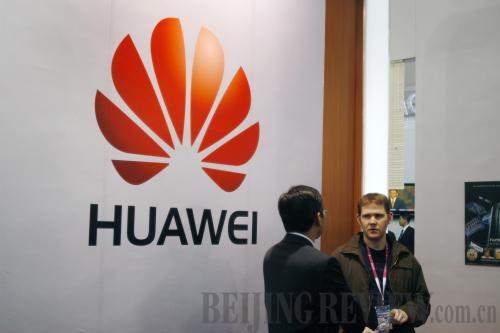|
 |
|
GOING GLOBAL: A representative of Huawei Technologies, China's leading telecom solutions provider, introduces his company to a visitor at an international exhibition in Beijing on March 23, 2008 (CFP) |

China has become one of the most rapidly growing providers of foreign direct investment (FDI) in the world. To people's surprise, the United States has been less than welcoming of China's desire to invest abroad, especially within America's borders.
The 2009 Statistical Bulletin of China's Outward Foreign Direct Investment jointly issued by China's Ministry of Commerce, National Bureau of Statistics and State Administration of Foreign Exchange on September 5, 2010 said, by the end of 2009, the total amount of China's FDI in the United States was only $3.338 billion, ranking sixth among all foreign countries and regions with Chinese investment.
Almost all developed countries fared poorly in absorbing, or even accepting, investment from China. Much of China's FDI has been directed at developing countries. By the end of 2009, only 7.4 percent—$18.17 billion—of China's total FDI was found in developed countries.
Barriers
One of the prime reasons why Chinese investors prefer developing countries to developed ones is there are too many political barriers against Chinese investment in developed countries. Take the United States for example. China's FDI in the U.S. manufacturing sector was mainly toward the manufacturing of transportation equipment, telecommunications equipment, computers and other electronic products, and medical equipment. They were all capital- and technology-intensive industries.
Chinese companies' efforts to invest in these industries, however, have long been hindered by the U.S. Government in the name of protecting national security.
In early 1990, when the China National Aero-technology Import-Export Corp. was looking to buy Mamco, a Seattle-based aircraft parts manufacturer, then U.S. President George H.W. Bush cited the Exon-Florio Amendment—which states in the case of a foreign multinational company's purchase of a U.S. company, the U.S. president should take into consideration its potential influence on the United States' leading position in national security technologies—and blocked the purchase.
In 2008, China's leading telecom solutions provider Huawei and Bain Capital, a U.S. private equity investment fund, failed in their efforts to acquire 3com, a U.S. digital electronics manufacturer. In 2010, Huawei was stopped again while bidding for Motorola's wireless network business.
China has long been the world's factory, but now it looks to step out into the world and make its mark. The rapid increase of China's FDI has been driven by its manufacturing companies' direct investment abroad.
Manufacturing companies accounted for 45.5 percent of China's investors in 2007, 42.7 percent in 2008 and 31.9 percent in 2009. But by the end of 2009, their total foreign investment accounted for only 5.5 percent of China's FDI. The fact that Chinese manufacturers face various barriers when investing in developed countries hinders their efforts to establish an international presence and is the key reason for such a small amount of capital making its way abroad.
Disputes
To complicate matters, the political hurdles the United States has put in China's way have become increasingly unpredictable. This was the case when the Committee on Foreign Investment in the United States (CFIUS) pressured Huawei to drop its deal of purchasing a share of 3Leaf Systems, a U.S. server technology company.
During the acquisition process, Huawei's California-based lawyer was certain declaring the deal to CFIUS was unnecessary, since the dollar amount of the deal—only $2 million—was far below the review threshold and the purchase was not a whole purchase but a share one.
| 